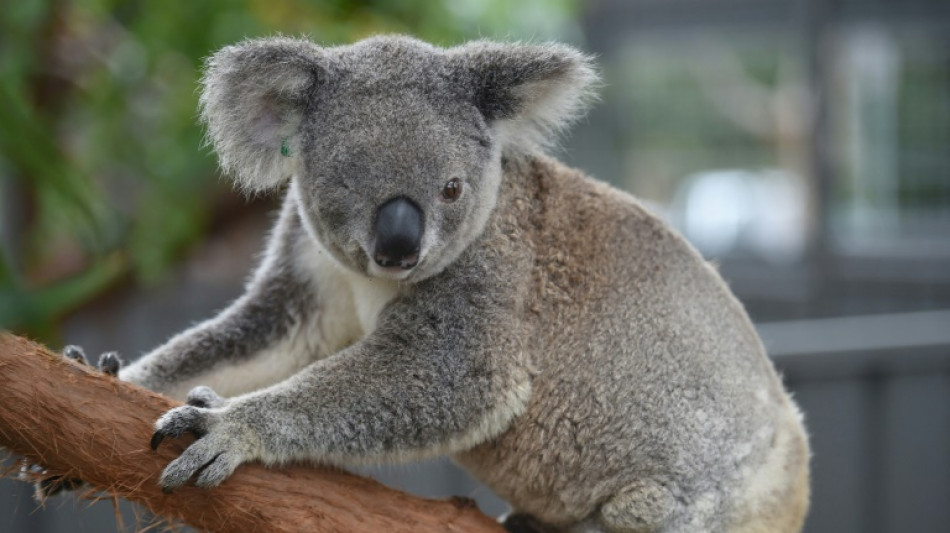
-
 EU leaders take stage in Davos as Trump rocks global order
EU leaders take stage in Davos as Trump rocks global order
-
Blast at Chinese restaurant in Kabul kills 7

-
 Warner hits 'Sinners' and 'One Battle' tipped for Oscar nominations
Warner hits 'Sinners' and 'One Battle' tipped for Oscar nominations
-
Colombian paramilitary-turned-peace-envoy sentenced over atrocities

-
 Gilgeous-Alexander leads Thunder in rout of Cavaliers
Gilgeous-Alexander leads Thunder in rout of Cavaliers
-
Seahawks blow as Charbonnet ruled out for rest of season

-
 Kostoulas stunner rescues Brighton draw after penalty row
Kostoulas stunner rescues Brighton draw after penalty row
-
Man Utd greats tell Martinez to 'grow up' as feud rumbles on

-
 LeBron James' All-Star streak over as starters named
LeBron James' All-Star streak over as starters named
-
Allies tepid on Trump 'peace board' with $1bn permanent member fee

-
 Ninth policeman dies in Guatemala gang riots, attacks
Ninth policeman dies in Guatemala gang riots, attacks
-
Man City's Foden to play through pain of broken hand

-
 Milan Fashion Week showcases precision in uncertain times
Milan Fashion Week showcases precision in uncertain times
-
Public media in Europe under unprecedented strain

-
 Africa Cup of Nations refereeing gets a red card
Africa Cup of Nations refereeing gets a red card
-
Tributes pour in after death of Italian designer Valentino

-
 Bills fire coach McDermott after playoff exit: team
Bills fire coach McDermott after playoff exit: team
-
Chile wildfires rage for third day, entire towns wiped out

-
 Valentino, Italy's fashion king who pursued beauty at every turn, dies at 93
Valentino, Italy's fashion king who pursued beauty at every turn, dies at 93
-
France PM to force budget into law, concedes 'partial failure'

-
 Allies tepid on Trump 'peace board' with $1bln permanent member fee
Allies tepid on Trump 'peace board' with $1bln permanent member fee
-
'My soul is aching,' says Diaz after AFCON penalty miss

-
 Ex-OPEC president in UK court ahead of corruption trial
Ex-OPEC president in UK court ahead of corruption trial
-
Iran warns protesters who joined 'riots' to surrender

-
 Stop 'appeasing' bully Trump, Amnesty chief tells Europe
Stop 'appeasing' bully Trump, Amnesty chief tells Europe
-
Central African Republic top court says Touadera won 78% of vote

-
 Trump tariff threat has global investors running for cover
Trump tariff threat has global investors running for cover
-
Spectacular ice blocks clog up Germany's Elbe river

-
 Trump says not thinking 'purely of peace' in Greenland push
Trump says not thinking 'purely of peace' in Greenland push
-
Syria's Kurds feel disappointed, abandoned by US after Damascus deal

-
 Man City sign Palace defender Guehi
Man City sign Palace defender Guehi
-
Under-fire Frank claims backing of Spurs hierarchy

-
 Prince Harry, Elton John 'violated' by UK media's alleged intrusion
Prince Harry, Elton John 'violated' by UK media's alleged intrusion
-
Syria offensive leaves Turkey's Kurds on edge

-
 Man City announce signing of defender Guehi
Man City announce signing of defender Guehi
-
Ivory Coast faces unusual pile-up of cocoa at export hubs

-
 Senegal 'unsporting' but better in AFCON final, say Morocco media
Senegal 'unsporting' but better in AFCON final, say Morocco media
-
New charges against son of Norway princess

-
 What is Trump's 'Board of Peace'?
What is Trump's 'Board of Peace'?
-
Mbappe calls out Madrid fans after Vinicius jeered

-
 Russians agree to sell sanctioned Serbian oil firm
Russians agree to sell sanctioned Serbian oil firm
-
Final chaos against Senegal leaves huge stain on Morocco's AFCON

-
 Germany brings back electric car subsidies to boost market
Germany brings back electric car subsidies to boost market
-
Europe wants to 'avoid escalation' on Trump tariff threat: Merz

-
 Syrian army deploys in former Kurdish-held areas under ceasefire deal
Syrian army deploys in former Kurdish-held areas under ceasefire deal
-
Louvre closes for the day due to strike

-
 Prince Harry lawyer claims 'systematic' UK newspaper group wrongdoing as trial opens
Prince Harry lawyer claims 'systematic' UK newspaper group wrongdoing as trial opens
-
Centurion Djokovic romps to Melbourne win as Swiatek, Gauff move on

-
 Brignone unsure about Olympics participation ahead of World Cup comeback
Brignone unsure about Olympics participation ahead of World Cup comeback
-
Roger Allers, co-director of "The Lion King", dead at 76


Nature at risk of 'cascading' species extinction: study
Climate change and habitat degradation will cause extinctions that cascade through communities of animals and plants and drive dramatic biodiversity loss, according to new research published on Friday.
The study, in the journal Science Advances, found that chain-reaction extinctions are unavoidable and predicted Earth's ecosystems will see average biodiversity loss of between six and 10 percent by 2050, depending on different carbon emissions scenarios.
By 2100, losses of animals and plants could rise to as much as 27 percent, they found in their research that used virtual Earths to map out thousands of food webs.
The authors said their modelling suggested that the biggest changes will come before mid-century, predicting "the bleakest time for natural communities might be imminent and that the next few decades will be decisive for the future of global biodiversity".
With life on Earth under threat from human destruction, overexploitation and pollution, scientists have warned that a million species are facing extinction in what many fear heralds the planet's sixth mass extinction event.
Climate change is expected to dramatically accelerate the losses, with impacts of warming ranging from the effects of extreme weather, to changes in behaviour and habitat.
But authors of the new study said previous modelling has not included estimates for co-extinctions, based on the "cascading effect" of losses on interdependent species.
The researchers in Australia and Europe built hundreds of virtual Earths each populated with more than 33,000 vertebrate species in thousands of food webs across the planet –- "massive computer latticeworks of 'who eats whom'," said co-author Corey Bradshaw, a professor at Flinders University.
They then simulated different climate change scenarios and projections of habitat degradation -- like deforestation -- to predict local biodiversity loss, the proportion of animalslost in a given area.
- 'Life support' -
The virtual worlds allowed researchers to watch as species moved around and adapted to new environmental conditions and the implications of individual extinctions across food webs.
They found that climate change would be responsible for the greatest proportion of extinction events.
"If you look out your window in 87 years, on average you'll see nearly 30 percent fewer animal species than you do today based on the business-as-usual climate scenario," Bradshaw told AFP.
The study found the greatest threat was in places with the greatest biodiversity -- 36 highly-vulnerable areas containing the most unique species.
"This is because the erosion of species-rich food webs makes biological communities more susceptible to future shocks," said Bradshaw, adding it was "a case of the rich losing their riches the fastest."
The research comes as a UN summit in Montreal attempts to seal a historic "peace pact with nature" and end the rampant destruction.
Global efforts to curb global warming have often eclipsed efforts to tackle the devastation being wrought on nature, but experts have increasingly warned that the two crises are inextricably linked.
"In many ways, biodiversity loss from climate change is far more serious than what climate change will do to human societies, because biodiversity is the very fabric of the Earth's life-support system that makes our lives possible," said Bradshaw.
"The imperative of massive and rapid emissions-reduction policies is made much more urgent knowing this."
L.Janezki--BTB



